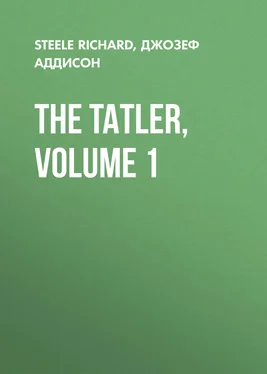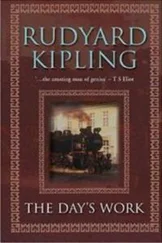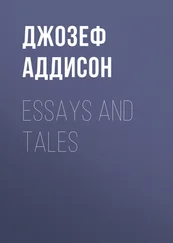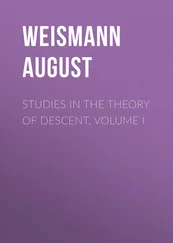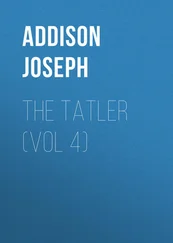Джозеф Аддисон - The Tatler, Volume 1
Здесь есть возможность читать онлайн «Джозеф Аддисон - The Tatler, Volume 1» — ознакомительный отрывок электронной книги совершенно бесплатно, а после прочтения отрывка купить полную версию. В некоторых случаях можно слушать аудио, скачать через торрент в формате fb2 и присутствует краткое содержание. Жанр: foreign_prose, foreign_antique, на английском языке. Описание произведения, (предисловие) а так же отзывы посетителей доступны на портале библиотеки ЛибКат.
- Название:The Tatler, Volume 1
- Автор:
- Жанр:
- Год:неизвестен
- ISBN:нет данных
- Рейтинг книги:4 / 5. Голосов: 1
-
Избранное:Добавить в избранное
- Отзывы:
-
Ваша оценка:
- 80
- 1
- 2
- 3
- 4
- 5
The Tatler, Volume 1: краткое содержание, описание и аннотация
Предлагаем к чтению аннотацию, описание, краткое содержание или предисловие (зависит от того, что написал сам автор книги «The Tatler, Volume 1»). Если вы не нашли необходимую информацию о книге — напишите в комментариях, мы постараемся отыскать её.
The Tatler, Volume 1 — читать онлайн ознакомительный отрывок
Ниже представлен текст книги, разбитый по страницам. Система сохранения места последней прочитанной страницы, позволяет с удобством читать онлайн бесплатно книгу «The Tatler, Volume 1», без необходимости каждый раз заново искать на чём Вы остановились. Поставьте закладку, и сможете в любой момент перейти на страницу, на которой закончили чтение.
Интервал:
Закладка:
Probably the Tatler was started by Steele without any very definite designs for the future. According to the first number, published on April 12, 1709, the aim was to instruct the public what to think, after their reading, and there was to be something for the entertainment of the fair sex. The numbers were published three times a week, on the post-days, at the price of one penny. Each paper consisted of a single folio sheet, and the first four were distributed gratuitously. Steele probably thought that his position of Gazetteer would enable him to give the latest news, and he says that these paragraphs brought in a multitude of readers; but as the position of the Tatler became established, the need for the support of these items of news grew less, and after the first eighty numbers they are of rare occurrence. Quite early in the career of the paper Addison, speaking of the distress which would be caused among the news-writers by the conclusion of a peace, said that Bickerstaff was not personally concerned in the matter; "for as my chief scenes of action are coffee-houses, playhouses, and my own apartment, I am in no need of camps, fortifications, and fields of battle to support me.... I shall still be safe as long as there are men or women, or politicians, or lovers, or poets, or nymphs, or swains, or cits, or courtiers in being." 1 1 No. 18.
The subject of each article was to be indicated by the name of the coffee-house or other place from which it was supposed to come: "All accounts of gallantry, pleasure, and entertainment shall be under the article of White's Chocolate-house; Poetry, under that of Will's Coffee-house; Learning, under the title of Grecian; Foreign and Domestic News you will have from Saint James's Coffee-house; and what else I have to offer on any other subject shall be dated from my own Apartment." For some time each number contained short papers from all or several of these places; but gradually it became usual to devote the whole number to one topic. The motto of the first forty numbers was "Quicquid agunt homines … nostri farrago libelli"; but in the following numbers it was changed to "Celebrare domestica facta"; and afterwards each number generally had a quotation bearing upon the subject of the day. Writing some time after the commencement of the latter, Steele said, in the Dedication prefixed to the first volume, "The general purpose of this paper is to expose the false arts of life, to pull off the disguises of cunning, vanity, and affectation, and to recommend a general simplicity in our dress, our discourse, and our behaviour." And elsewhere he says: "As for my labours, which he is pleased to inquire after, if they but wear one impertinence out of human life, destroy a single vice, or give a morning's cheerfulness to an honest mind; in short, if the world can be but one virtue the better, or in any degree less vicious, or receive from them the smallest addition to their innocent diversions; I shall not think my pains, or indeed my life, to have been spent in vain." 2 2 No. 89.
At the close, speaking in his own name, Steele wrote: "The general purpose of the whole has been to recommend truth, innocence, honour, and virtue, as the chief ornaments of life; but I considered, that severity of manners was absolutely necessary to him who would censure others, and for that reason, and that only, chose to talk in a mask. I shall not carry my humility so far as to call myself a vicious man, but at the same time must confess my life is at best but pardonable." 3 3 No. 271.
With his usual generosity, Steele more than once spoke in the warmest terms of the assistance rendered to him by Addison. In the preface to the collected edition he said: "I have only one gentleman, who will be nameless, to thank for any frequent assistance to me, which indeed it would have been barbarous in him to have denied to one with whom he had lived in an intimacy from childhood, considering the great ease with which he is able to despatch the most entertaining pieces of this nature. This good office he performed with such force of genius, humour, wit, and learning that I fared like a distressed prince, who calls in a powerful neighbour to his aid; I was undone by my auxiliary; when I had called him in I could not subsist without dependence on him." And in 1722, after Addison's death, in a preface to his friend's play, "The Drummer," Steele wrote of the Tatler , "That paper was advanced indeed! for it was raised to a greater thing than I intended it! For the elegance, purity, and correctness which appeared in his writings were not so much my purpose, as (in any intelligible manner, as I could) to rally all those singularities of human life, through the different professions and characters in it, which obstruct anything that was truly good and great."
It is only fair to Steele to point out that the original idea of the Tatler was entirely his own, and that he alone was responsible for the regular supply of material. Addison was in Ireland when the paper was begun, and did not know who was the author until several numbers had appeared. His occasional contributions were of little importance until after eighty numbers had been published; and of the whole 271 numbers Steele wrote about 188 and Addison only 42, while they were jointly responsible for 36. Swift contributed only to about a dozen numbers; and the assistance received from other writers was so slight that it does not call for notice here. Steele, unlike Addison, was probably at his best in the Tatler , where he had a freer hand, and described, in a perfectly fresh and unaffected style, the impressions of the moment. Hastily composed in coffee-house or printing-office, as they often were, and at very short notice, his papers frequently appeal to the reader of the present day more than the carefully elaborated and highly finished work of his friend, who wrote only when he found a suitable topic. And if Addison's art is of a higher standard than Steele's, it is to Steele that we owe Addison. A minor poet and the author of a book of travels and of an unsuccessful opera, Addison found no opportunity for his peculiar genius until his friend provided the means in the Tatler . It is tolerably certain that he would himself never have taken the necessary step of founding a periodical appealing to the general public; and Steele himself said with perfect truth, "I claim to myself the merit of having extorted excellent productions from a person of the greatest abilities, who would not have let them appear by any other means." 4 4 Spectator , No. 532.
If more is said here of Steele than of Addison, it is because it is Steele whose name is most intimately connected with the Tatler . The field in which Addison shone brightest was the Spectator , where the whole plan was arranged in the manner best suited to his genius. But his influence is, nevertheless, visible in the development of the earlier paper, and some of his individual articles are equal to anything he afterwards wrote. It is only necessary to mention his papers on the Distress of the News-Writers 5 5 Tatler , No. 18.
; on the poetaster, Ned Softly 6 6 No. 163.
; on the pedant and "broker in learning," Tom Folio 7 7 No. 158.
; on the Political Upholsterer, who was more inquisitive to know what passed in Poland than in his own family 8 8 Nos. 155, 160.
; and on the Adventures of a Shilling. 9 9 No. 249.
His, too, are the Vision of Justice 10 10 Nos. 100, 102.
; the story of a dream; 11 11 No. 117.
and the amusing account of the visit to London of Sir Harry Quickset, who, with his old-world breeding, was the forerunner of Sir Roger de Coverley. 12 12 No. 86.
Интервал:
Закладка:
Похожие книги на «The Tatler, Volume 1»
Представляем Вашему вниманию похожие книги на «The Tatler, Volume 1» списком для выбора. Мы отобрали схожую по названию и смыслу литературу в надежде предоставить читателям больше вариантов отыскать новые, интересные, ещё непрочитанные произведения.
Обсуждение, отзывы о книге «The Tatler, Volume 1» и просто собственные мнения читателей. Оставьте ваши комментарии, напишите, что Вы думаете о произведении, его смысле или главных героях. Укажите что конкретно понравилось, а что нет, и почему Вы так считаете.
